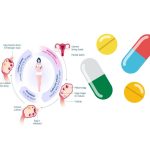What Are The Side Effects Of Postinor-2 On Menstruation?

Menstruation is the shedding of the lining of the uterus (endometrium) accompanied by bleeding. It occurs in approximately monthly cycles throughout a woman’s reproductive life, except during pregnancy. Menstruation starts during puberty (at menarche) and stops permanently at menopause.
By definition, the menstrual cycle begins with the first day of bleeding, which is counted as day 1. The cycle ends just before the next menstrual period. Menstrual cycles normally range from about 25 to 36 days. Only 10 to 15% of women have cycles that are exactly 28 days. Also, in at least 20% of women, cycles are irregular. That is, they are longer or shorter than the normal range. Usually, the cycles vary the most and the intervals between periods are longest in the years immediately after menstruation starts (menarche) and before menopause.
Menstrual bleeding lasts 3 to 7 days, averaging 5 days. Blood loss during a cycle usually ranges from 1/2 to 2 1/2 ounces. A sanitary pad or tampon, depending on the type, can hold up to an ounce of blood. Menstrual blood, unlike blood resulting from an injury, usually does not clot unless the bleeding is very heavy.
The menstrual cycle is regulated by hormones. Luteinizing hormone and follicle-stimulating hormone, which are produced by the pituitary gland, promote ovulation and stimulate the ovaries to produce estrogen and progesterone. Estrogen and progesterone stimulate the uterus and breasts to prepare for possible fertilization.
What is Postinor-2?
Postinor-2 is a brand of levonorgestrel, an emergency contraceptive pill, it is not intended as a regular method of contraception. It is used to prevent pregnancy when taken within 72 hours of unprotected intercourse. It is estimated that Postinor-2 will prevent 85% of expected pregnancies. 95% of expected pregnancies will be prevented if taken within the first 24 hours, declining to 58% if taken between 48 hours and 72 hours after unprotected intercourse. You should use other safe sex practices such as condoms, diaphragms, etc. If you don’t get your periods within 3 weeks of taking the pill then you should do a urine pregnancy test to confirm pregnancy.
Side Effects Of Postinor-2 On Menstruation
Postinor-2 causes possible changes to your next period, most women have their next period at the usual time, although some may have their period a few days earlier or later than normal. Results from studies indicate that menstrual bleeding and cycle disturbance are among the most frequent side effects associated with emergency contraceptive pills like Postinor-2, with some 30% of users reporting bleeding within seven days of treatment and up to 13% experiencing more than 7 days’ delay in menses.
Postinor-2 may cause other side effects. Tell your doctor if any of these symptoms are severe or do not go away:
• breast pain or tenderness
• diarrhea
• dizziness
• headache
• heavier or lighter than usual menstrual bleeding
• nausea
• spotting or bleeding between menstrual periods
• tiredness
• vomiting
Some side effects can be serious. If you experience the following symptom, call your doctor immediately:
• severe lower abdominal pain (3 to 5 weeks after taking levonorgestrel)
If the bleeding continues for more than 1 week after taking Postinor-2, check with your doctor right away. Levonorgestrel may cause other side effects. Call your doctor if you have any unusual problems while taking this medication.
If you experience a serious side effect, you or your doctor may send a report to the Food and Drug Administration’s (FDA) MedWatch Adverse Event Reporting program online (http://www.fda.gov/Safety/MedWatch) or by phone (1-800-332-1088).





